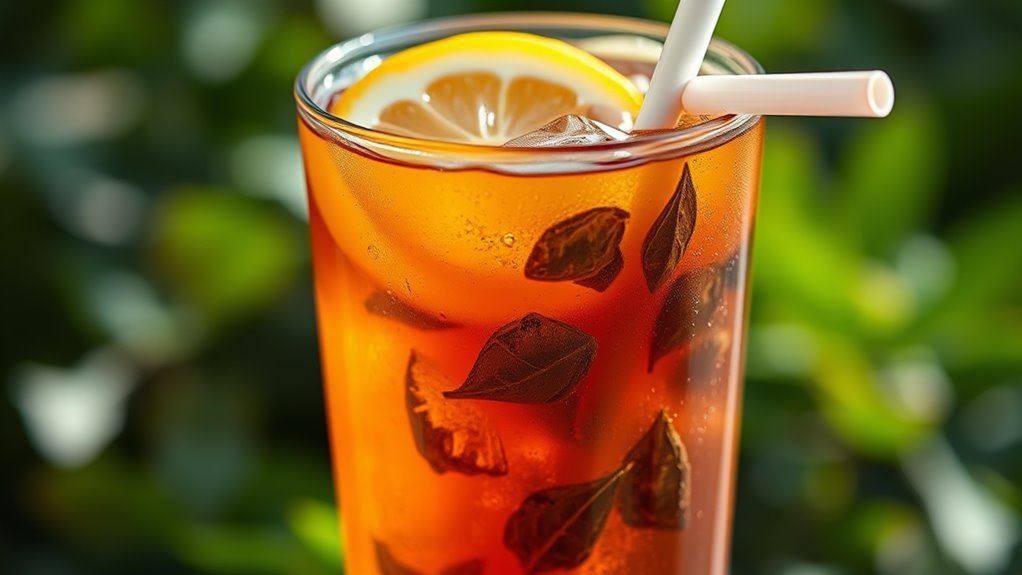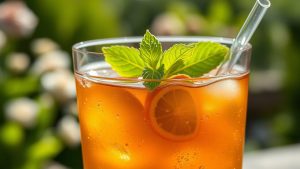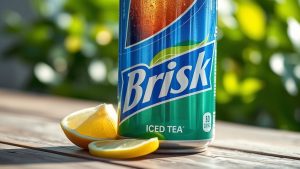
Iced tea typically contains between 10 to 70 milligrams of caffeine per 8-ounce serving, with the amount varying based on the type of tea and how it's brewed. For instance, black iced tea usually has 25 to 50 milligrams, while green iced tea averages 15 to 30 milligrams. Factors like steeping time and water temperature also affect caffeine levels. If you're curious about specific brands and comparisons, there's more to explore on this topic.
When you reach for a rejuvenating glass of iced tea, you might wonder just how much caffeine is in it. The caffeine content in iced tea can vary considerably, ranging from 10 to 70 milligrams per 8-ounce serving. This variation depends on several factors, such as the type of tea used and the brewing method. Understanding these nuances can help you make informed choices about your iced tea consumption.
The caffeine content in iced tea varies widely, influenced by tea type and brewing method.
If you choose black iced tea, you're likely to find it contains approximately 25 to 50 milligrams of caffeine per 8 ounces. On the other hand, green iced tea typically has a lower caffeine content, averaging between 15 to 30 milligrams. White iced tea falls within a similar range, containing about 15 to 35 milligrams. It's important to highlight that herbal teas are usually caffeine-free unless they contain blended caffeinated tea leaves. The brewing method you use can also play a considerable role in determining the final caffeine content of your iced tea.
Branded iced teas offer additional insights into caffeine levels. For instance, Lipton iced tea typically contains 25 to 55 milligrams of caffeine per 8 ounces, while Bigelow iced tea provides around 30 to 45 milligrams. If you opt for Arizona Iced Tea (black), you'll find about 15 milligrams of caffeine in an 8-ounce serving. Snapple Iced Tea comes in various flavors, averaging around 42 milligrams of caffeine. Meanwhile, Nestea has about 25 milligrams in a 16.9-ounce bottle, which translates to roughly 18 milligrams per 8 ounces.
When comparing iced tea to other beverages, it generally contains less caffeine than coffee, which has around 80 to 100 milligrams per 8 ounces. In contrast, iced tea often has more caffeine than many sodas, which typically range from 20 to 40 milligrams in a 12-ounce serving. Energy drinks, however, are much more caffeinated, boasting up to 150 milligrams per 8 ounces. Matcha can have 60 to 80 milligrams, often surpassing iced tea. Even iced coffee tends to contain more caffeine than iced tea.
Several factors influence the caffeine extraction process in iced tea. Steeping time is vital; a longer steep allows for more caffeine to be extracted from the leaves. The quantity of tea leaves used also affects caffeine levels: more leaves mean more caffeine. Water temperature matters too; hotter water extracts caffeine more effectively. Hotter water is fundamental to bear in mind the type of tea leaves, as their intrinsic caffeine levels differ.
While moderate caffeine intake can help increase alertness and decrease fatigue, excessive consumption may lead to adverse effects like insomnia and anxiety. Sensitivity to caffeine varies among individuals, influenced by factors like body weight and genetics. If you're concerned about caffeine, you might think about herbal teas, which are naturally caffeine-free.
Ultimately, understanding these dynamics allows you to enjoy iced tea while managing your caffeine intake wisely.
Conclusion
To sum up, iced tea offers a revitalizing way to enjoy caffeine, with an average of 30 to 50 milligrams per 8-ounce serving. Curiously, this means you could consume nearly as much caffeine from iced tea as from a cup of decaf coffee. So, the next time you sip on iced tea, remember that it's not just a tasty beverage; it's a subtle source of energy too. Moderation is key, but it can certainly perk up your day!



